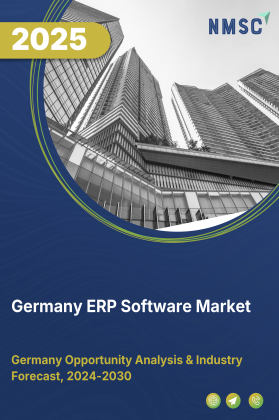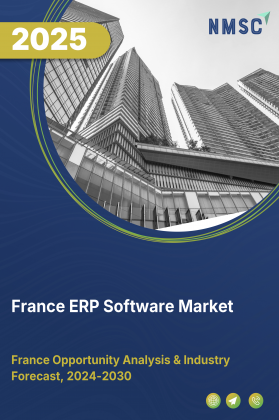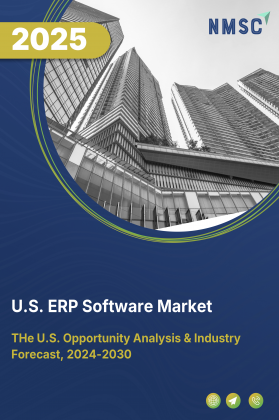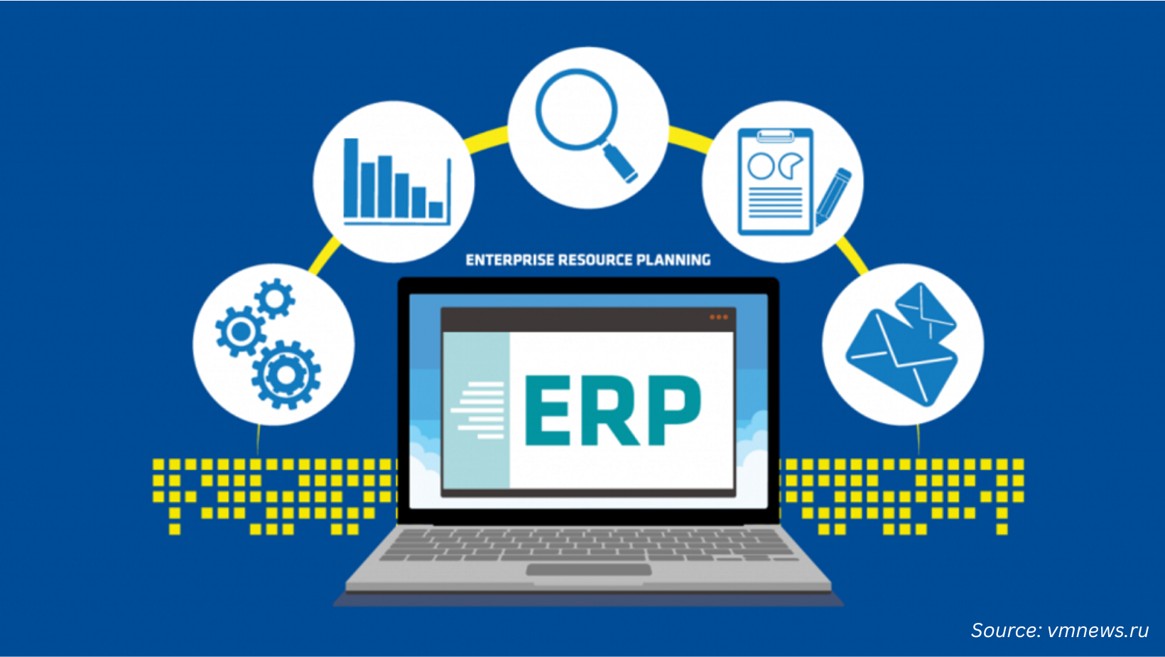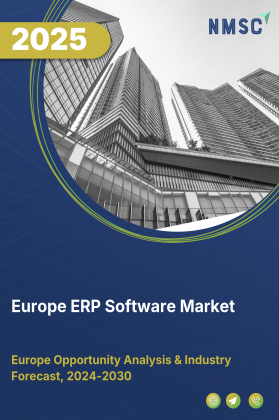
Europe ERP Software Market by Component (Software, and Services), Deployment (On-Premise, Cloud, and Hybrid), Business Function (Enterprise Asset Management, Financial Management, Human Capital Management, and Others), Application (Manufacturing, BFSI, Healthcare, Retail & Distribution, Government, IT & Telecom, and Others), and End Users (Small & Medium Enterprises, and Large Enterprises) – Trends and Forecast, 2025–2030.
Industry: ICT & Media | Publish Date: 16-Oct-2025 | No of Pages: N/A | No. of Tables: N/A | No. of Figures: N/A | Format: PDF | Report Code : IC3595
Europe ERP Software Market Report - Comprehensive Overview | |
| Study Period | -5 - 2030 |
| Base Year for Estimation | 2024 |
| Forecast Data Period | 1 - 2030 |
| Market Size in Base Year | 30.82 |
| Market Size in Forecast Year | 62.97 |
| Growth Rate 2026 - 2030 | 12.65% |
| Growth Factors | |
| Report Coverage | The report provides insights on market size, forecasts, emerging trends, competitive landscape, key segments, growth opportunities, recent developments, and strategic recommendations to help stakeholders make informed business decisions. |
| Segments Covered | |
| Countries Covered | 11 |
| Geographical Analysis | Europe |
| Companies Profiled | Top 10 companies |
| Competitive Landscape | |
| Market Share | Available for top 10 companies |
| Customization Scope | Free customization (equivalent to up to 80 working hours of analysts) after purchase. Addition or alteration to country, regional, and segment scope. |
| Purchase Option | Avail customized purchase options to meet your exact research needs. |
Industry Outlook
The Europe ERP Software Market size was valued at USD 30.82 billion in 2024 and is projected to grow to USD 36.35 billion by 2025. Additionally, the industry is expected to continue its growth trajectory, reaching USD 62.97 billion by 2030, with a CAGR of 11.62% from 2025 to 2030.
Government-led digital initiatives are playing a pivotal role in driving the ERP software market development across Europe, with programs like the UK’s Unity Programme showcasing the benefits of modern, cloud-based platforms in public administration. This trend is mirrored by growing ERP adoption in Europe’s industrial and manufacturing sectors, where countries like Germany are leveraging these systems to support digital transformation and maintain global competitiveness.
However, widespread ERP implementation is challenged by high costs, particularly for small and medium-sized enterprises that struggle with the financial burden of deployment and maintenance. At the same time, the integration of Internet of Things (IoT) technology with ERP systems is emerging as a powerful growth enabler, offering real-time data visibility, operational control, and predictive capabilities that enhance efficiency across industries like manufacturing and logistics.
Government-led Digital Initiatives Boost ERP Market Growth
In Europe, national governments are increasingly investing in ERP solutions to modernize outdated administrative systems and promote efficient digital governance. A standout example is the UK Government’s Unity Programme, launched in November 2024, with a USD 460 million allocation to transition legacy ERP, HR, and finance systems to cloud-based platforms.
Targeting critical agencies like the Department for Transport and the Ministry of Housing, the programme aims to unify core functions such as finance, procurement, HR, and payroll. The initiative is projected to generate USD 719 million in benefits over 15 years and save approximately USD 111 million when compared to decentralized system upgrades.
As governments demonstrate the value of centralized, cloud-based ERP platforms, private sector organizations are increasingly encouraged to follow suit, accelerating the Europe ERP software market expansion across the UK and potentially influencing other European nations pursuing similar modernization agendas.
Industrial and Manufacturing Growth Propels the ERP Market Expansion
Europe's industrial powerhouses, particularly Germany, are significantly driving ERP demand through the expansion and digital transformation of the manufacturing sector. In 2024, Germany’s manufacturing sector contributed 19.7% to the country’s gross value added, according to the Federal Statistical Office, reflecting the sector’s strategic economic role.
These platforms enable real-time data access, streamline production workflows, and support Industry 4.0 integration, making them critical tools for sustaining competitiveness in both domestic and global markets. As industrial modernization accelerates, especially in sectors like automotive, electronics, and machinery, the ERP market is poised for steady growth throughout Europe.
High Implementation Costs for SMEs Restraint ERP Adoption
Despite the positive Europe ERP software market growth trajectory, the significant costs tied to ERP implementation continue to pose a major obstacle, especially for small and mid-sized enterprises (SMEs). Expenses related to software licensing, system customization, employee training, and ongoing maintenance often deter businesses from investing in ERP solutions. These financial burdens slow adoption in cost-sensitive sectors and represent a key constraint on broader market development.
IoT-Driven ERP Solutions Expand Operational Efficiency and Market Opportunities
The integration of Internet of Things (IoT)technology with ERP systems is becoming a key catalyst for growth, offering enhanced real-time data visibility and improved operational control. IoT-enabled ERP platforms allow businesses to efficiently track inventory, monitor equipment conditions, and anticipate maintenance needs, significantly boosting performance in industries like manufacturing and logistics.
A notable example is the March 2025 launch of Epicor Kinetic 2025 by Epicor Software Corporation, a next-generation ERP solution featuring advanced IoT capabilities for real-time monitoring and predictive maintenance in manufacturing settings. This development underscores the transformative role of IoT in enhancing ERP functionalities and reflects the increasing market demand for intelligent, connected enterprise solutions.
U.K. Dominates the ERP Software Market, With the Highest Projected CAGR Till 2030.
The UK stands out as the dominant force in the Europe ERP software market share across the region, experiencing the highest CAGR of 14.70%, driven by key vendors delivering industry-specific and cloud-based solutions tailored to evolving business needs. In May 2024, Forterro launched Fortee, a cloud ERP platform designed for SME discrete manufacturers and industrial startups, offering rapid deployment within 40 days and modules for purchasing, CRM, and supply chain management.
In April 2025, intact followed with GenetiQ, a cloud-native, browser-based ERP solution tailored to the merchant and wholesale distribution sectors, praised for its high degree of personalization and integrated business intelligence capabilities. Additionally, in February 2025, Sage introduced Sage Intacct Construction in the UK, a cloud-native financial and operations solution specifically built for the construction sector, delivering real-time financial insights and enhanced operational efficiency. These targeted product launches are accelerating digital transformation, streamlining operations, and driving widespread ERP adoption across diverse UK industries.
Competitive Landscape
The market players operating in the Europe ERP software industry include SAP SE, Microsoft Corporation, Oracle NetSuite, Sage Group plc, Workday, Inc., Xero Limited, Epicor Software Corporation, Deltek, Inc., Odoo, Abas Software AG, Rockwell Automation, Infor, Unit4, IFS, QAD Inc and others.
Europe ERP Software Market Key Segments
By Component
-
Software
-
Service
By Deployment
-
On Premise
-
Cloud
-
Hybrid
By Business Function
-
Enterprise Asset Management (EAM)
-
Record Assets (Asset Mgmt)
-
Analytics & BI
-
Disposal of Assets
-
Others
-
-
Financial Management System
-
Core Financials
-
Corporate Performance Mgmt (CPM)
-
Financial Consolidation
-
Others
-
-
Human Capital Management (HCM)
-
Talent Management
-
Administrative HR
-
Workforce Management
-
Others
-
-
Manufacturing and Operations
-
Production Planning and Scheduling Products
-
Production Ops and Control Products
-
Manufacturing Information Mgmt Products
-
Others
-
-
Supply Chain Management (SCM)
-
Inventory management
-
Warehouse management
-
Transportation management
-
Procurement
-
Contract Management
-
-
Others
By Application
-
Manufacturing
-
BFSI
-
Healthcare
-
Retail & Distribution
-
Government
-
IT & Telecom
-
Construction
-
Aerospace & Defense
-
Other Industries
By End Users
-
Small and Medium-Sized Enterprise
-
Large Enterprise
By Country
-
The UK
-
Germany
-
France
-
Italy
-
Spain
-
Denmark
-
Netherlands
-
Finland
-
Sweden
-
Norway
-
Russia
-
Rest of Europe
Key Players
-
Microsoft Corporation
-
Oracle NetSuite
-
Sage Group plc
-
Xero Limited
-
Epicor Software Corporation
-
Deltek, Inc.
-
Odoo
-
Abas Software AG
-
Rockwell Automation
-
Infor
-
Unit4
-
IFS
-
QAD Inc.
Report Scope and Segmentation:
|
Parameters |
Details |
|
Market Size in 2025 |
USD 36.35 billion |
|
Revenue Forecast in 2030 |
USD 62.97 billion |
|
Growth Rate |
CAGR of 11.62% from 2025 to 2030 |
|
Analysis Period |
2024–2030 |
|
Base Year Considered |
2024 |
|
Forecast Period |
2025–2030 |
|
Market Size Estimation |
Billion (USD) |
|
Growth Factors |
|
|
Countries Covered |
12 |
|
Companies Profiled |
15 |
|
Market Share |
Available for 10 companies |
|
Customization Scope |
Free customization (equivalent up to 80 working hours of analysts) after purchase. Addition or alteration to country, regional, and segment scope. |
|
Pricing and Purchase Options |
Avail customized purchase options to meet your exact research needs. |

















 Speak to Our Analyst
Speak to Our Analyst



